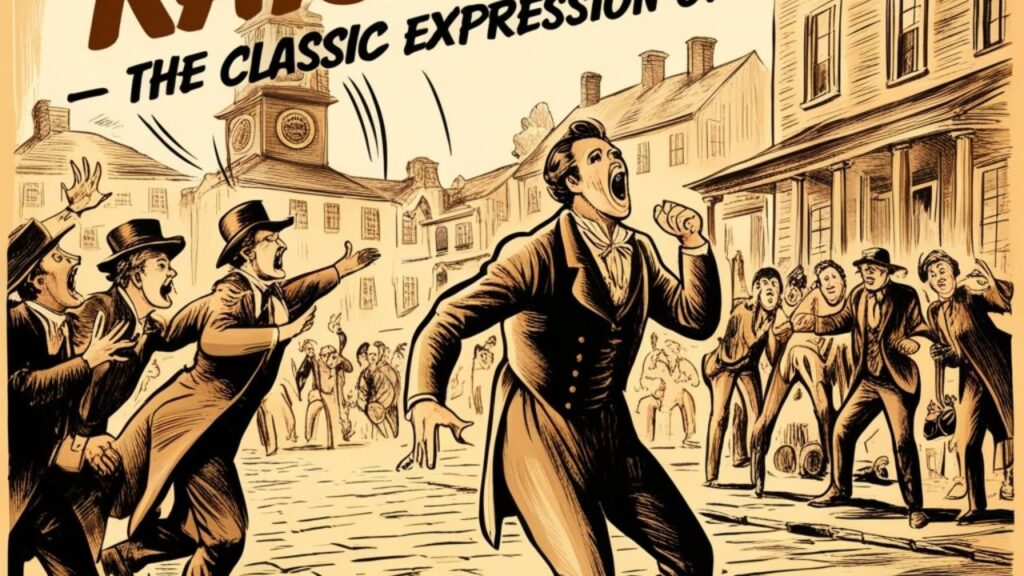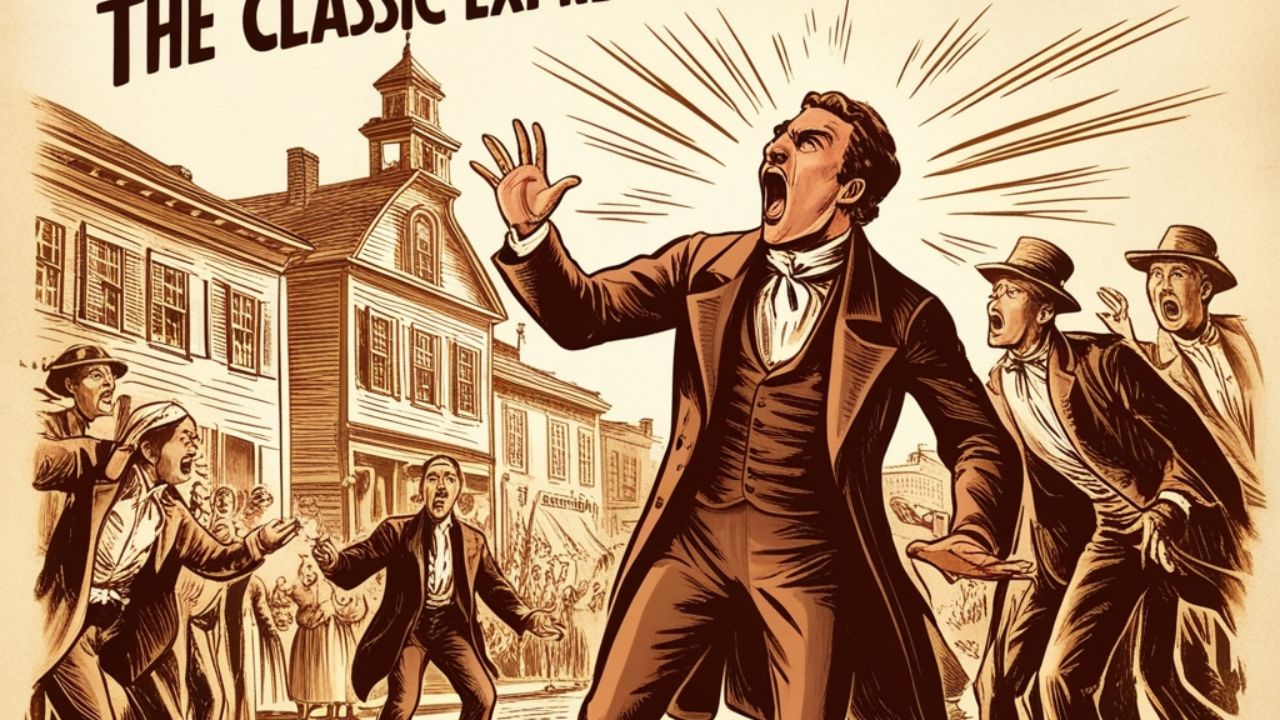Raise Cain is an old saying people use when someone makes a lot of noise or trouble. It shows strong emotion and energy. Long ago, it came from a story in the Bible about a man named Cain who did something very bad.
People use this phrase to describe wild or loud behavior. When someone raises Cain, it means they are acting upset or making a big scene. It often shows anger, excitement, or protest, but not always in a bad way.
Today, the phrase appears in songs, books, and movies. It adds color to stories and helps show strong feelings. Many writers like using Raise Cain because it sounds lively and full of spirit, reminding us of old sayings that still matter.
What Does “Raise Cain” Really Mean?
Raise Cain means to make loud noise or cause trouble in a place. It shows strong feeling and energy. People use this phrase when someone acts wild, angry, or very excited. It tells that something big or noisy is happening around.
Writers and speakers often use Raise Cain to show emotion or power in a story. It helps describe moments of chaos or fun. The phrase makes language colorful and easy to imagine, even for small readers who enjoy lively expressions.
Core Implications of “Raise Cain”:
- It shows loud and strong behavior, often full of emotion and energy.
- It means creating noise, disorder, or trouble to express anger or excitement.
- It reflects rebellion or protest against rules, limits, or unfair treatment.
The Biblical Backstory: Cain and Abel
To understand “raise Cain,” we need to revisit one of the oldest recorded sibling rivalries in human history: Cain and Abel in the Book of Genesis.
See also Polite vs Courteous: The Subtle Difference Explained
Summary of the Cain and Abel Story
Cain and Abel were the first sons of Adam and Eve. Cain worked in the fields, and Abel cared for animals. God liked Abel’s gift more, which made Cain very angry. His anger led him to do something very wrong.
After that moment, Cain and Abel became a story about jealousy and choices. Cain had to leave his home and live far away. This story teaches everyone to control anger, show kindness, and choose peace instead of harm.
| Character | Role in the Story | Symbolism |
| Cain | Firstborn son of Adam and Eve | Jealousy, guilt, punishment, exile |
| Abel | Younger brother, favored by God | Innocence, victimhood, righteousness |
Why This Matters to the Idiom
The phrase Raise Cain first appeared in old American writing from the 1800s. People used it to describe noisy trouble or wild behavior. It was popular in small towns, where stories and jokes often included strong and colorful sayings.
Writers began using Raise Cain in newspapers and books to make scenes lively. The words showed action, emotion, and spirit. Over time, it became a common saying across America, known for its energy and old-fashioned charm.
Historical Usage: From Scripture to American Slang

While the roots are ancient, the idiom “raise Cain” began appearing in its modern form in the early 19th century, especially in American English.
First Documented Use
The phrase Raise Cain first appeared in old American writing from the 1800s. People used it to describe noisy trouble or wild behavior. It was popular in small towns, where stories and jokes often included strong and colorful sayings.
Writers began using Raise Cain in newspapers and books to make scenes lively. The words showed action, emotion, and spirit. Over time, it became a common saying across America, known for its energy and old-fashioned charm.
- The phrase Raise Cain appeared in American writing around the year 1830.
- It was first seen in newspapers and stories describing loud or wild actions.
- Over time, it became a common idiom across the United States, showing strong emotion and energy.
Why “Raise Cain” Stuck: The Power of Language Evolution
Over time, English idioms morph from literal interpretations to figurative shorthand. “Raise Cain” is a prime example of how religious symbolism fused with colloquial energy.
Evolution Path of the Idiom
- It began with the Biblical story of Cain, symbolizing anger and rebellion.
- Later, it entered American speech in the 1800s, used to describe noisy or wild behavior.
- Today, it appears in modern culture, keeping its lively and dramatic meaning alive.
Similar Phrases: Variations and Synonyms for “Raise Cain”
Let’s take a look at how “raise Cain” compares to similar expressions.
Comparison Table
| Raise Cain | Stir up noisy trouble | Dramatic | US, classic slang |
| Raise Hell | Cause chaos, act rebelliously | Aggressive | US, widespread |
| Kick Up a Fuss | Complain loudly, disruptively | Mild-moderate | UK/US |
| Stir the Pot | Instigate conflict subtly | Passive | US/Global |
| Raise the Roof | Make a loud celebration or protest | Joyful/angry | US/UK |
| Cut Up Rough | React violently | Intense | UK, informal |
Regional and Cultural Variations
The idiom “raise Cain” is more commonly heard in Southern and Midwestern parts of the United States, often passed down through family storytelling or oral tradition.
Other Cultural Equivalents
| Region | Similar Idiom | Meaning |
| UK | Kick up a row | Make a scene, protest loudly |
| Ireland | Go ballistic | React violently or emotionally |
| Australia | Chuck a wobbly | Lose one’s temper suddenly |
| South Africa | Cause a skrik | Frighten or startle aggressively |
| Urban US slang | Go off | Explode in anger or energy |
Modern Usage of “Raise Cain” in Pop Culture & Speech
While less common in everyday Gen Z lingo, “raise Cain” still pops up in:
Film & TV
- The phrase Raise Cain became widely known through the 1992 film Raising Cain by Brian De Palma, showing inner conflict and chaos.
- Many Western and Southern movies use it to add realistic, old-style speech.
- In TV dramas and comedies, it highlights scenes of anger, rebellion, or playful mischief.
See also When to Use Concurrent vs Simultaneous in Writing
Music
- Country legends like Johnny Cash and Hank Williams used the phrase to express bold, rebellious spirit in their songs.
- Many rock and blues tracks include it to show freedom, energy, and attitude.
- Modern artists use Raise Cain to give lyrics a classic, emotional, and fiery touch.
Literature
- Writers in Southern Gothic stories, like Flannery O’Connor, used the phrase to show conflict and moral struggle.
- Many novels use Raise Cain to describe strong emotion or family tension.
- It adds depth and color to storytelling, linking modern writing with old traditions.
Is “Raise Cain” Still Relevant in 2025?

With evolving slang like “pop off,” “snap,” “go feral,” or “start drama”, is “raise Cain” obsolete?
Not quite.
Why It’s Still Valuable:
- The phrase Raise Cain brings strong emotion and history together, making language more expressive.
- It adds style and power to writing or speech without using harsh words.
- Its classic sound keeps it useful for stories, songs, and creative communication.
Google Trends Insight
Data from Google Trends shows that people still look for this phrase online. Interest rises when it appears in songs, movies, or books. Many readers enjoy learning how old expressions continue to bring fun and meaning to language today.
Writers and teachers use Google Trends to study language changes. It helps them see which idioms stay popular over time. This tool proves that classic expressions still catch attention and stay useful in both learning and daily talk.
How to Use “Raise Cain” Naturally in Sentences
If you’re writing dialogue, storytelling, or just want to add flavor to your language – here’s how.
Example Sentences
- The children raised Cain when their teacher canceled the playground time.
- Grandpa raised Cain at the store after the clerk overcharged him.
- She raised Cain at the meeting because no one listened to her idea.
Final Thoughts
The phrase Raise Cain reminds people of strong emotion and old stories. It joins history with language, showing how words can live for many years. Its sound and meaning still bring color and power to writing and speaking today.
Writers keep using Raise Cain because it adds feeling and excitement. It helps describe noisy or wild moments in a simple way. This expression remains special, connecting modern speech with timeless lessons about energy and emotion.
FAQs
What does “raising Cain” mean?
It means causing trouble, chaos, or loud disturbance, often by acting wild or rebellious.
What does it mean to raise Cain in the Bible?
It refers to behaving wickedly, inspired by Cain, who committed the first murder in the Bible.
Is Raising Cane a biblical reference?
No, “Raising Cane” (like the restaurant name) isn’t biblical—it’s a play on the phrase “raising Cain.”
Is it Cain or cane?
The correct idiom is “raising Cain,” referring to the biblical Cain, not “cane.”

Join Bibcia on a journey to master English grammar. Discover easy lessons, writing tips, and practical examples designed to make learning grammar simple and effective.










